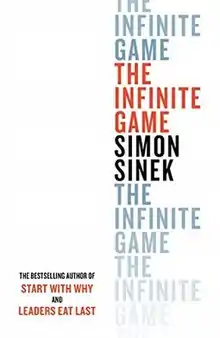The Infinite Game
The Infinite Game is a book by Simon Sinek published in 2019. The book is an application of ideas from James P. Carse's similarly titled book, Finite and Infinite Games, to the domain of business and organizational structure. Sinek begins by summarizing Carse's distinction between two different types of games: finite games (e.g. chess and football) which are played for the purpose of ending play consistent with static rules and infinite games (e.g. business and politics) which are played for the purpose of continuing play. Sinek claims that leaders who embrace an infinite mindset, aligned with infinite play, will build stronger, more innovative, inspiring, resilient organizations, though these benefits may accrue over larger timescales than benefits associated with a finite mindset.[1]
 First edition | |
| Author | Simon Sinek |
|---|---|
| Language | English |
| Subject | Leadership |
| Genre | Business |
| Published | 2019 |
| Publisher | Portfolio/Penguin |
Publication date | 2019 |
| Pages | 251 |
| ISBN | 9780735213500 |
Overview
Sinek argues that business fits all the characteristics of an infinite game, notably that: there may be known as well as unknown players; new players can join at any time; each player has their own strategy; there is no set of fixed rules (though law may operate as semi-fixed rules); and there is no beginning or end. Further drawing on Carse's work, Sinek extends the distinction between end states in finite games to claim that business, when viewed through an infinite mindset, does not have winners and losers, but rather players who simply drop out when they run out of the will, the desire, and/or the resources to continue play. According to Sinek, it follows that business leaders should stop thinking about who wins or who is the best and start thinking about how to build and sustain strong and healthy organizations.
Leaders who want to adopt an infinite mindset must follow five essential practices:
- Advance a Just Cause
- Build Trusting Teams
- Study their Worthy Rivals
- Prepare for Existential Flexibility
- Demonstrate the Courage to Lead.
Just Cause
A Just Cause is what gives our work (or that of an organization) meaning. It is the world we hope to build and what inspires us to keep playing the infinite game. A Just Cause must be:
- For something—affirmative and optimistic
- Inclusive—open for all to contribute
- Service oriented—for the benefit of others
- Resilient—able to endure change
- Idealistic—big, bold and ultimately unachievable
A Just Cause is not our Why. Why is our origin story, who we are, our values and beliefs. A Just Cause is our vision of the future.
See also
References
- Sinek, Simon (2019). The Infinite Game. Portfolio/Penguin. p. 151. ISBN 9780735213500.
Further reading
- Carse, James P. (1987). Finite and Infinite Games. New York: Ballantine Books. ISBN 978-0-345-34184-6.
External links
- Most Leaders Don't Even Know the Game They're In | Simon Sinek at Live2Lead 2016 on YouTube
- What game theory teaches us about war | Simon Sinek on YouTube
- NPR - How I Built Resilience: Live with Simon Sinek
